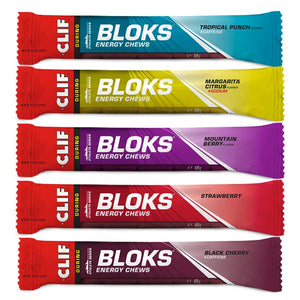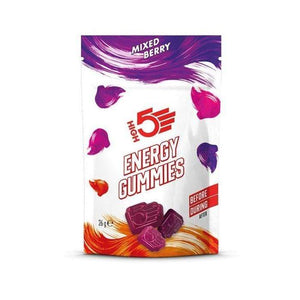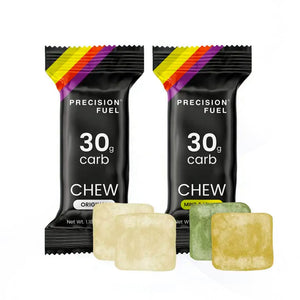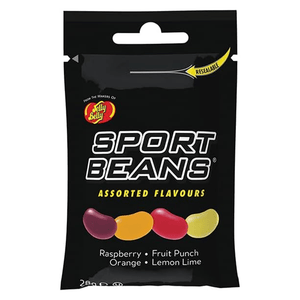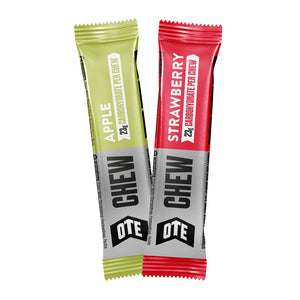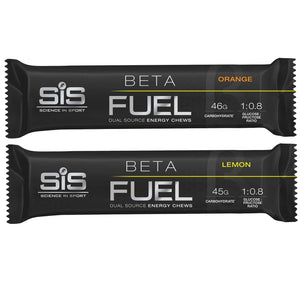It’s your choice - with our knowledge.

Energy Chews: How & When You Should Use Them
Energy Chews are becoming an increasingly popular choice for those looking for a convenient way to consume carbohydrates whilst exercising. Coming in the form of small easy to chew gummies, they typically contain a blend of carbohydrates and electrolytes providing similar benefits to those of an energy gel.
You can use our Nutrition Calculator to work out how many chews you may need for a session.
What are the benefits for energy chews?
- Convenience: Energy chews are very convenient and portable. Their small size allows them to easily fit into pockets, bags, or running belts without taking up much space. This makes them easy to bring along on a run, hike, bike ride, or any activity where you want an energy boost. You don't have to worry about carrying around bulky food items.
- No Mess: Energy chews are not messy like energy gels or sticky like some protein bars. They have a solid texture that doesn't leave residue on your hands. You can eat them cleanly without needing to immediately wash your hands afterwards. This allows you to quickly refuel wherever you are, whether on a trail or in the middle of a race.
- Portion Control: Energy chews come in pre-portioned servings, usually around 100 calories per chew. This makes it easy to consume just the amount of calories you need. If you only need a small boost, you can eat just one chew. You don't have to estimate portions or rewrap uneaten gels or bars. The pre-portioned chews allow you to accurately consume the desired amount of energy.
Energy chews provide the carbohydrates and quick energy of gels with the convenience of a bar, but without the messiness or need to portion bars. Their portability and pre-measured servings make them an efficient and clean way to refuel during any activity.
Energy chews are perfect for mid to long distance runs and can be used very similarly to energy gels, so which you opt for is down to personal preference but here are a few things to consider if you decide to give energy chews a go.
If you want find out more about energy gels compared with energy chews, you can read our article 9 Benefits of Energy Gels and Energy Chews
How to choose the right energy chew?
Everyone has different preferences, and you may need to try a few different chews before you find the right one for you. But bear in mind that they tend to come in three different textures - gummy, soft, and hard.
Some examples of each are:
- Gummy: Clif Bloks, GU Chews, High5 Gummies, Powergel Shots
- Soft- PF 30 Chew, Veloforte Cubos Energy Chews
- Hard - Torq Energy Chew, Jelly Belly Sports Beans
As mentioned, energy chews come in gummy, soft, and hard textures:
- Gummy chews have a jelly-like texture that is chewy and easy to eat.
- Soft chews have a dense, doughy texture that requires more chewing but may be easier to digest.
- Hard chews have a firmer, almost candy-like texture that takes longer to chew but may provide a longer energy release.
Also a choice of a Soft form chewier gummy bars 226ers Vegan Gummy Bar, SiS Beta Fuel Chew, OTE Energy Chew and 32Gi Sports Chews
Consider which texture you prefer and find easiest to consume during physical activity. Gummy and soft textures are often the most popular for their portability and quick energy delivery. Harder chews work well for hiking, climbing, or activities where you want energy released over hours.
How to use energy chews?
Energy chews can be a versatile part of your fueling strategy for workouts and races. While they provide quick-absorbing carbohydrates like traditional energy gels, their texture and flavors make them easier for many athletes to consume. Properly integrating chews into your nutrition plan can enhance both your performance and enjoyment.
Energy chews can be taken on their own, providing a solid source of 30 to 50 calories and 5 to 15 grams of carbs per piece.
Consume one serving every 20 to 30 minutes during longer moderate intensity efforts, or one every 10 to 15 minutes during intense endurance activities. The simple sugars will be quickly digested and delivered to your working muscles.
For variety, chews pair well with energy drinks or gels. The fluids help you stay hydrated while the chews give you something to chew, alleviating flavour fatigue. Just be mindful of your overall carb intake. Ideally you want 60 to 80 grams per hour from a combination of fuel sources. Don't overdo it on the chews just because they taste good.
Flavours and textures can vary widely between brands. Test different chews during training to learn which your stomach can tolerate and which flavors maintain their appeal even when pushing hard. Consume a familiar, appealing chew right before a tough climb or sprint for an instant boost.
Avoid the temptation to chew and store multiple pieces in your mouth. Only chew what you can swallow, as the carbs are best absorbed through the stomach, not the mouth. Drink fluids after consuming to aid digestion and absorption.
With some experimentation, you can discover the ideal energy chew for you. Used properly and thoughtfully, chews can take your fueling to the next level by providing tasty, efficient calories.
When to use energy chews?
Energy chews can provide a quick and effective carbohydrate boost anytime you need increased stamina and focus during endurance exercise lasting over an hour. While similar guidelines apply as with gels, chews offer some unique benefits that make them ideal for certain scenarios.
- Before: Chewing a serving 15 to 30 minutes before a workout or race provides an easy to digest dose of carbs to fuel your muscles right from the start. This "topping off" of glycogen stores delays fatigue so you can maintain intensity longer.
- During: Once you hit 45 to 60 minutes of continuous effort, chews are an easy way to replenish carbs and electrolytes without needing water. Chew and swallow a serving to provide vital fuel for the next hour.
- Tough Sections: Right before a big climb, sprint finish, or maximum effort interval, quickly chew a serving for instant energy your muscles can use. The simple carbs will hit your system rapidly.
- Flavour Fatigue: If you tire of the flavour of gels or drinks, chews can provide a change of pace and make fueling feel more fun. This ensures you keep consuming adequate calories and don't underfuel.
Always follow serving recommendations based on body weight and intensity. While chews make fueling more fun, consuming too many can lead to GI distress. Used strategically, they provide quick energy when you need it most.
Key information about energy chews
- Ingredients: Make sure to check the carbohydrate source and other ingredients used. Look for chews that use complex carbs for sustained energy along with glucose or maltodextrin for fast absorption. Some also include electrolytes, caffeine, vitamins, protein, fats, and other ingredients to meet different nutrient needs.
- Pairing: Consider how you will pair the chews with other supplements. You may want plain chews you can easily combine with hydration mixes or electrolyte tablets. Or opt for chews with added sodium, potassium, etc. so you don't need additional electrolyte sources.
- Testing: It's always smart to test new fuels before using them in a race or big effort. Try different chew flavors and textures on shorter training sessions and see how your stomach tolerates them and how the energy release feels.
It’s your choice - with our knowledge.









































































































